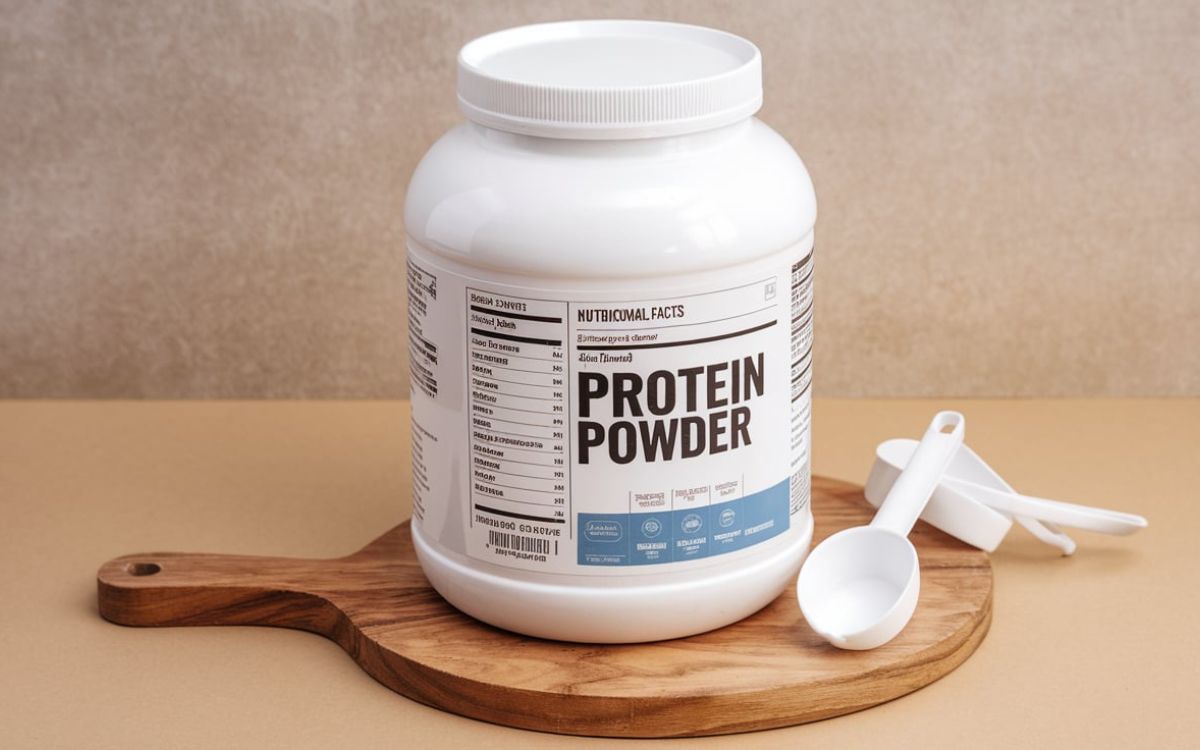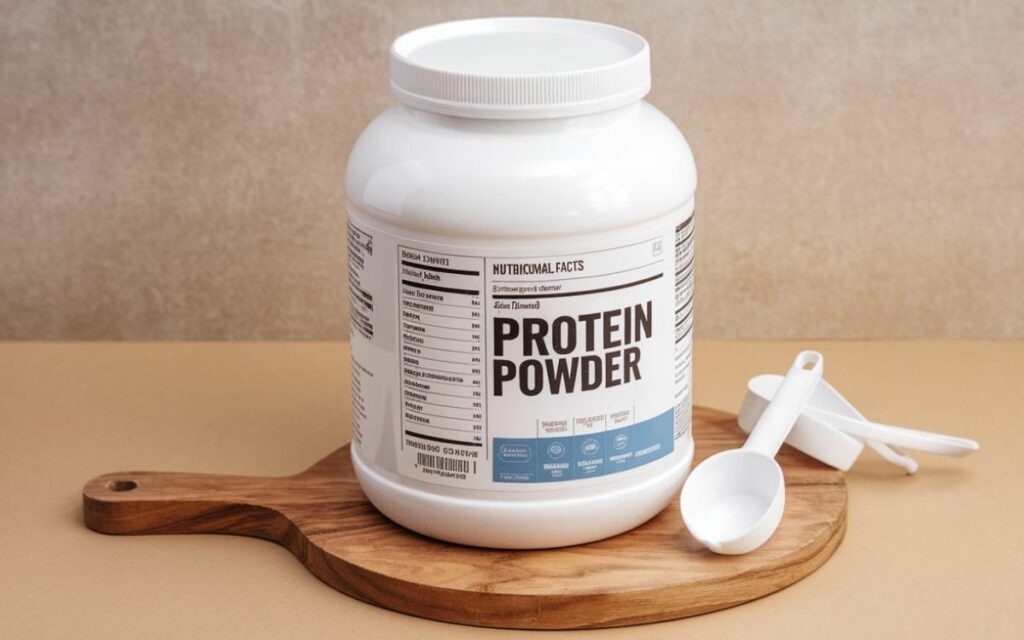We’ve all been there. You triumphantly haul home that giant tub of protein powder, vowing to conquer your fitness goals. But life gets busy, routines shift, and suddenly, you’re staring down a container with a date that’s become a distant memory.
This might lead you to wonder: what to do with expired protein powder? Tossing it out seems wasteful, but consuming it might be risky.
This comprehensive guide will walk you through everything you need to know about handling expired protein powder. Let’s dive in!

Understanding Protein Powder Expiration Dates
Protein powder expiration dates are set by the manufacturer based on extensive testing and research. These dates represent the point at which the product is no longer guaranteed to maintain its full potency and quality.
Related Article: Can You Put Protein Powder in Water?
After this date, the powder may begin to degrade, losing its nutritional value and potentially becoming unsafe to consume. It’s important to note that the expiration date is not a hard and fast rule.
Properly stored protein powder can often remain safe to use for a period of time after the expiration date, but the quality and effectiveness will gradually diminish. However, it’s always best to err on the side of caution and avoid consuming protein powder that is significantly past its expiration.
Why Is It Important to Properly Handle Expired Protein Powder?
First off, why should you care about how you handle expired protein powder? Well, properly handling expired protein powder ensures your safety and prevents potential health risks.
Consuming expired protein powder can lead to digestive issues, especially if it has developed mold or bacteria. Plus, improper disposal can harm the environment.
Related Article: Does Protein Powder Have Lactose?
Once that expiration date has come and gone, things start to get a bit tricky. Expired protein powder can pose several risks:
- Nutritional Degradation: Over time, the protein, vitamins, and other nutrients in the powder can start to break down, diminishing its potency and health benefits.
- Bacterial Growth: Expired protein powder can become a breeding ground for harmful bacteria, such as Salmonella and E. coli, putting your health at risk if consumed.
- Taste and Texture Changes: Expired protein powder may take on an unpleasant taste or grainy texture, making it unpalatable and unappetizing.
So, what’s the best way to handle that expired tub of protein? Let’s dive in and explore your options.
How Can Expired Protein Powder Be Safely Disposed Of?
Now, let’s get into the nitty-gritty of how can expired protein powder be safely disposed of. Here are some environmentally friendly ways to get rid of it.
Related Article: Is Protein Powder Good for Teens? What Does Experts Say?
1. Composting
Believe it or not, protein powder can be composted! If it’s plant-based, it can add valuable nutrients to your compost pile. Even if it’s whey or casein, small amounts can be okay. Make sure to mix it well with other compost materials to avoid clumping.
2. Using It in the Garden
You can use expired protein powder as a slow-release fertilizer for your plants. It can provide nitrogen and other nutrients. Just sprinkle it lightly around your garden and water it in. Don’t overdo it—too much can harm your plants.
3. Baking and Cooking
If the protein powder is only slightly past its expiration date and still smells and tastes okay, you might use it in baking or cooking. Add it to pancakes, muffins, or smoothies where its taste and texture are masked. However, use your judgment—if it seems off, it’s better to be safe and not consume it.
4. Animal Feed
Some people use expired protein powder as animal feed. If you have pets like dogs or chickens, you might add small amounts to their food. Always research and ensure it’s safe for your specific pet before doing this.
Related Article: Do You Mix Protein Powder with Water or Milk?
5. Kitty Litter or Coffee Grounds
Pour the expired powder into a sealable plastic bag or container. Then, mix it with an absorbent material like kitty litter or used coffee grounds. This will help solidify the powder, making it less likely to leak or spill.
6. Trash Disposal
If none of the above options work, you can dispose of the protein powder in your household trash. Make sure it’s sealed in a bag to avoid attracting pests or creating a mess.
What Are the Signs of Spoiled Protein Powder?
You’ve got your protein powder, but how can you tell if it’s gone bad? Here are a few signs to look out for:
- Smell: If your protein powder smells rancid or like something other than its usual flavor, it’s time to toss it. A sour, musty, or even just “off” smell means it’s likely gone bad.
- Appearance: Check for any color changes or clumps. If your protein powder has become discolored or has developed clumps, it’s a sign that it’s not fresh.
- Texture: If your protein powder feels gritty or grainy, it’s probably not good anymore. Fresh protein powder should be smooth and powdery.
- Taste: If your protein powder tastes off, like it’s gone stale or has a bitter taste, it’s best to throw it away diet sheriff.
If you notice any of these signs, it’s best to err on the side of caution and discard your protein powder. It’s not worth risking your health for a few extra shakes.
How to Prevent Protein Powder Expiration in the Future?
Of course, the best way to deal with expired protein powder is to prevent it from happening in the first place. Here are a few tips to help extend the shelf life of your favorite supplements:
- Buy in smaller quantities: Resist the urge to stock up on massive tubs of protein powder. Instead, opt for smaller containers that you can realistically consume before the expiration date.
- Store properly: Keep your protein powder in a cool, dry place, away from direct sunlight and moisture. The fridge or a pantry is usually a good bet.
- Check expiration dates: Before making a purchase, always double-check the expiration date and make sure you have enough time to use up the entire container.
- Rotate your stash: Practice the “first in, first out” method by using the oldest containers first, and replenishing your supply with new ones.
By following these simple guidelines, you can help ensure that your protein powder stays fresh and ready to fuel your fitness journey for as long as possible.
There you have it, folks – a complete understanding about what to do with expired protein powder. So, the next time you find yourself staring at an expired tub of protein powder, don’t fret! Consult this comprehensive guide and decide whether to revive it or retire it.
Explore Also:
Creativehouseblog
Gigasecurehome
Mycleanseplan
What to Do with Expired Protein Powder – FAQs
Is it safe to consume expired protein powder?
While consuming expired protein powder is unlikely to cause harm, it’s essential to check the product’s appearance, smell, and texture before consuming it. If it looks, smells, or tastes off, it’s best to err on the side of caution and discard it.
Can I return expired protein powder to the manufacturer or store?
It depends on the manufacturer’s or store’s return policy. Check the packaging or website for specific guidelines. Some companies may offer refunds, exchanges, or store credits for expired or near-expired products.
What happens if I accidentally consume expired protein powder?
Most likely, nothing terrible will happen. Protein powder is generally safe to consume even after its expiration date, but it’s always a good idea to pay attention to your body’s reaction. If you experience any digestive issues or discomfort, stop using the powder and consult with a doctor if needed.
How long does protein powder last after the expiration date?
The shelf life of protein powder after the expiration date varies depending on factors like storage conditions, packaging, and product quality. Generally, protein powder can remain stable for 3-6 months after the expiration date, but its quality and potency may degrade over time.
Can I donate expired protein powder to a local food bank or charity?
It’s unlikely that a food bank or charity will accept expired protein powder, as they typically follow strict guidelines for food donations. However, you can consider donating unopened, unexpired protein powder to a local gym, fitness center, or non-profit organization that accepts donations of fitness supplements.






